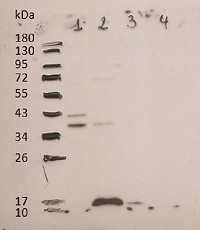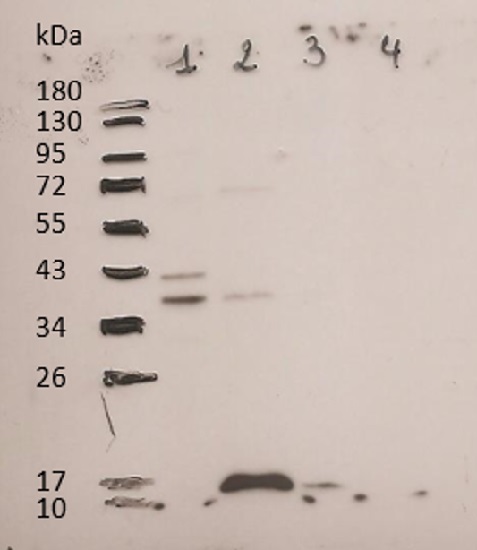1

Api g 1 | Major allergen Api g 1, isoallergen 2
AS19 4335 | Clonality: Polyclonal | Host: Rabbit | Reactivity: Apium graveolens
- Product Info
-
Immunogen: Recombinant Apium graveolens Major allergen Api g 1, isoallergen 2 protein, amino acids: 1-159, UniProt:P92918 Host: Rabbit Clonality: Polyclonal Purity: >95%, Protein G purified to a total immunoglobulin G fraction. Format: Liquid Quantity: 50 �g Storage: Store at -20�C or -80�C, avoid repeated freeze-thaw cycles. Make aliquots to avoid repeated freeze-thaw cycles. Please remember to spin the tubes briefly prior to opening them to avoid any losses that might occur from material adhering to the cap or sides of the tube. Tested applications: ELISA (ELISA) Recommended dilution: to be determined by end user - Reactivity
-
Confirmed reactivity: Apium graveolens - Application Examples
-

Samples:
1 – 12 µg celery (Apium graveolens) leaves, proteins extracted with 10% TCA/Acetone
2 – 12 µg (Apium graveolens) stems, proteins extracted with 10% TCA/Acetone
3- 12 µg (Apium graveolens) leaves, proteins extracted with 50mM Tris-HCl, pH7.4; 150 mM NaCl, protease inhibitors, followed by protamine sulfate depletion (0.1% for RuBisCO removal) and precipitated with 10% TCA/Acetone
4- 12 µg (Apium graveolens) leaves, proteins extracted with 50mM Tris-HCl, pH7.4; 150 mM NaCl, protease inhibitors
MW marker (kDa): PageRuler™ Prestained Protein Ladder (Thermo Fisher Scientific)12 µg/well of total protein extracted freshly from celery (Apium graveolens) with 10% TCA/ Actetone (samples 1 and 2) and with 50mM Tris-HCl, pH7.4; 150 mM NaCl, protease inhibitors, followed by protamine sulfate depletion (0.1% for RuBisCO removal) and precipitated with 10% TCA/Acetone (samples 3 and 4) and denatured in Laemmli buffer at 70°C for 5 min. The samples were separated on 10 % SDS-PAGE and blotted 1h to nitrocellulose using wet transfer. Blot was blocked with 2 % milk TBS-T at 4°C/ON without agitation. Blot was incubated in the primary antibody at a dilution of 1: 1 000 for 1h/RT with agitation in TBS-T with agitation. The antibody solution was decanted and the blot was rinsed briefly twice, then washed once for 15 min and 3 times for 5 min in TBS-T at RT with agitation. Blot was incubated in Agrisera matching secondary antibody (anti-rabbit IgG horse radish peroxidase conjugated, AS09 602) diluted to 1:25 000 in TBS-T for 1h/RT with agitation. The blot was washed as above and developed for 5 min with Agrisera ECL SuperBright. Exposure time was 60 seconds.
Courtesy of Yordan Muhovsky, Walloon Agricultural Research Centre CRA-W · Department of Life Sciences, Belgium - Additional Information
-
Additional information: Preservative: 0,03% Proclin 300, Preparation contains: 50% Glycerol, 10 mM PBS, pH 7,4 - Background
-
Background: Major allergen Api g 1, isoallergen 2 (Allergen Api g 1.0201) (allergen Api g 1) - Protocols
-
ELISA protocol
Protocols to work with plant and algal protein extracts
Agrisera Educational Poster Collection - Reviews:
-
This product doesn't have any reviews.



